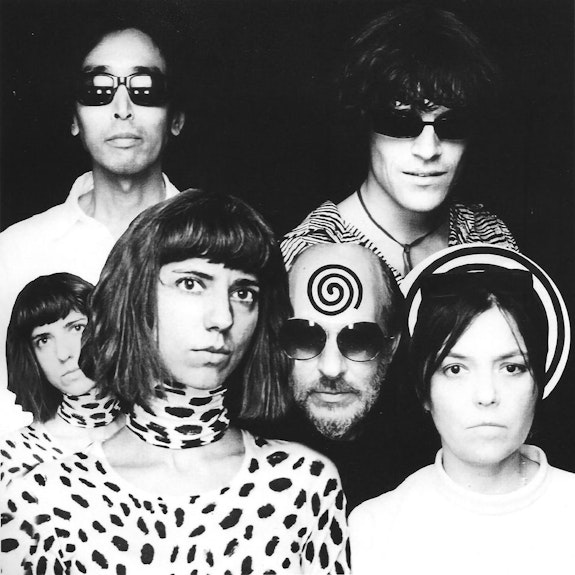Music
The Best Band You Never Heard Of: Vanishing Twin's Global Aesthetic
Vanishing Twin’s debut album, 2016’s Choose Your Own Adventure, featured the British band’s integration of psychedelic pop à la Broadcast’s first three albums and the instrumental/textural sophistications of mid-career Stereolab, with the majority of tracks occurring as ambitious, albeit frequently imitative, reconfigurations. Their second full-length release, last year’s The Age of Immunology, affirms the band’s ties to the above-mentioned artists as well as the sub-genre of ambient pop—though with significant departures from inherited stylistics. With this project, the band displays a more consummate skill for crafting melodic hooks. Protracted instrumental segments hold the listener’s attention more consistently, the quintet navigating complex rhythms and innovative progressions. In addition, the band references and recontextualizes 50-plus years of electro-ambience, from the primitive sounds of Kraftwerk to the refined vistas of Suso Sáiz.
The album opens with the spacey “KRK (At Home in Strange Places),” Cathy Lucas’s vocal bringing to mind the lilting voice of Trish Keenan (Broadcast’s singer who died from pneumonia in 2011). A notable ethereality is introduced that persists throughout the release, complemented by sultry rhythms and un-patterned accents. Droning synths and “clean” piano parts mix with low-key orchestral elements to forge a non-homeostatic and mutative sound. “Wise Children” opens with churning sonics, alternately soothing and anxiety-inducing. “Out past the rights / and the wrongs of our lives / there is a field / I’ll meet you there,” Lucas sings, referencing the over-quoted poem by Rumi. Echoing lines that are now part and parcel of pop culture, Lucas riskily adopts a New Age-y and generically gentle advocation for egoic transcendence, wisdom associated with the ability to orient oneself beyond default propensities and ambitions.
“Cyronic Suspension May Save Your Life” is one of Immunology’s high-points, a skillfully arranged hypnagogic jam, the infectious rhythm sustained throughout the track, various melodic elements introduced, briefly explored, and truncated. A listener may experience an emotional and/or energetic contraction at the point where Lucas’s vocal emerges, responding to a saccharine or sentimental quality that detracts from the band’s instrumental and ambient expansiveness; that is, the entrance of Lucas’s vocal surprisingly turns the track from a trip-hop-y exploration into an easy-listening jingle.
That said, the following track, “You Are Not an Island,” shows Lucas at her best, a reverb-drenched delivery supported by minimal accompaniment, a softly picked acoustic guitar bathed in various trebly and droning sounds. Vocals and instrumentation coalesce, resulting in a psychedelic gestalt that is neither inaccessibly quirky nor banally etheric. Discordant sounds and arrhythmic progressions borrow from folktronic templates, particularly approaches explored by Tunng on their sub-genre-defining projects Comments of the Inner Chorus (2006) and Good Arrows (2007). The track ends with a scarily cacophonic segment, a footnote to the hauntology and sampledelia forged by such ensembles as Julian House’s The Focus Group (check out the 2009 joint effort Broadcast and the Focus Group Investigate Witch Cults of the Radio Age), Ariel Pink, and Grouper (for example, 2008’s Dragging a Dead Deer up a Hill or 2013’s The Man Who Died in His Boat).
“Magician’s Success” contains the project’s most mainstream melody and composition, reminiscent of Camera Obscura’s brand of indie pop, particularly various tracks from Let’s Get Out of This Country (2006) and My Maudlin Career (2009). On one of the album’s more intriguing lyrics, Lucas sings, “The noise of hope / is like a racket in my heart,” her underscoring of the notion that hope is often desire well-masked, simply “attachment” packaged in a less offensive form. These lyrics can’t help but nudge a listener to consider the role of hope in their own life, to ask: what is life without hope? How, without the balm of hope, do we successfully navigate our world, its pressing issues and unique crises? Does the release of hope facilitate a greater level of acceptance and, thereby, open new possibilities for action that may not have been previously entertained?
The exotic “Planète Sauvage” is driven by the spoken vocals and busy percussion parts of Elliott Arndt, who notably contributed to worldbeat and experimental works by the Brit/Bahrainian Flamingods and noise-punk trio Yak. The track highlights Vanishing Twin’s allegiance to communal artistry. “Invisible World” shows the band further exploring spoken-word approaches and ambient instrumentation, sounds a bit formulaic, lyrics adolescently cosmic, reminiscent of a cheesy narration in a prototypical sci-fi flick: “velvet sounds across starlight / a thousand million things we cannot see.” The album closes with “Language Is a City (Let Me Out!),” again featuring Elliott Arndt, this time on flute, meandering melodies that conjure a distinctly ’60s vibe, the era with which Vanishing Twin, as a quasi-collective, most deeply resonates—creatively, philosophically, and socioculturally.
While Stereolab and Broadcast were influenced by the aesthetics and underlying politics of Surrealism, which evolved from World War I Dadaism, and the Situationist movement, a product of 1960’s antiauthoritarianism, Vanishing Twin has probably been prompted in large part by the rise of global nationalism, including the election of Donald Trump in the US, the complexities of Brexit in the UK, and the rise of anti-immigrant sentiments in response to population displacements in Syria and elsewhere. Lyrically, instrumentally, and in terms of collaborative partnering, Vanishing Twin operates in protest to the political, social, and individualistic compressions that have occurred in many parts of the Western world and beyond. A listener is well-advised to approach the band’s offerings as de facto political statements, performative partnerships that represent models for how the world might realistically embrace otherness, transcending the perennial drive for national, political, and psychological borders. The Age of Immunology, approached strictly as a musical document, vacillates between the sublime and the predictable; in terms of the synergistic and stylistic diversities represented, however, it offers an inspiring message, an example of how disparate people might come together, how utopian visions might actually be rendered.


